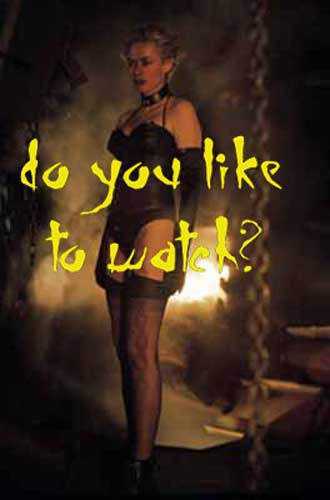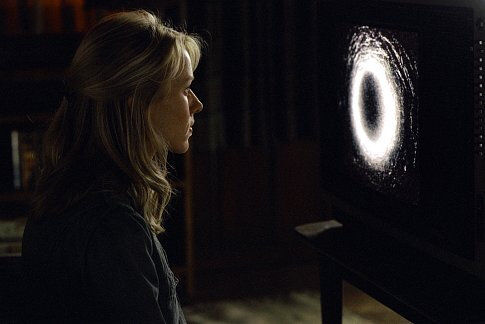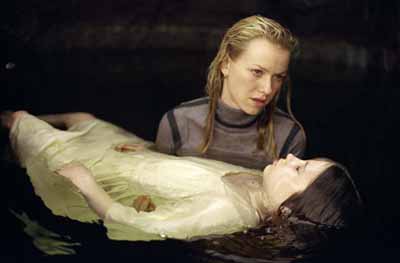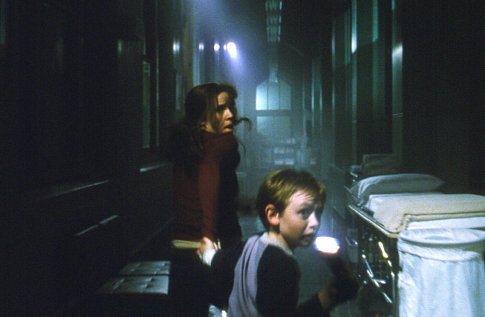
Within
the space of a year, I saw the same story in three different movies.
That's not terribly uncommon. There are fads in film plotting just as
in anything else. A few years ago, I was fine with just the one volcano movie,
and managed to dodge the asteroid disaster craze in its entirety. I can only
regret I didn't bail on the whole old-ladies-take-trips sub-genre far,
far earlier.
But these were horror movies, and that genre is uniquely responsive to the
public mood in a way, say, that the mid-nineties rash of Jessica Tandy flicks
(may God rest her lovely and talented soul) are not. They are also a new variation
in the ghost movie. (for more on that subject, please see "The
End of The Innocents" from Vol.
33 of The Cobra's Nose.
Also, the normal spoiler warning should be considered in effect.)
The first, released on August 30, 2002, is the most straight forward. FeardotCom
is the name of a URL appropriated by the vengeful spirit of a murdered woman.
Though seemingly nice enough in life, Jeannie's web mistress persona
is fully accoutered with bondage wear and she greets each new visitor with
a come hither gaze and the query, "Do you like to watch?" Aroused
surfers click through the disclaimers until they reach the main attraction:
horrific slayings by Jeannie's murderer, who is still at large.
And though she doesn't bother with details, anybody who just watched
the show has two days to bring him to justice. If time runs out before then,
Jeannie kills the viewer in the manner he or she most dreads. Pitiless, yes,
but the ghost seems to feel the viewers had it coming--there must be
consequences for voluntarily watching something so vile, for making an entertainment
of terror.
About two months later, on October 2, 2002, the American re-make of the Japanese
film The Ring was released. I haven't seen the original, Ringu,
and so cannot comment on its faithfulness to it. Both have to do
with mysterious videotape. After the tape plays, the phone rings and a creepy
voice says, "Seven days." As in FeardotCom, that is the
viewer's projected lifespan. When a group of teenagers in different
locations are found dead with similar grotesque symptoms, the reporter aunt
of one of them begins piecing the mystery together. The urgency of her quest
is amplified after she, her ex-lover, Noah, and their son all watch the tape
and receive the message. Unlike the kinky thrill delivered on feardotcom.com,
the videotape plays like a puzzle begging to be solved ("Very student
film," Noah clucks).
And so, the reporter, Rachel, dutifully follows the clues, tries to dig up the root causes of the little girl discontent that blossomed into full-blown malevolence after death. In the nick of time Rachel finds the vengeful ghost's murdered remains and insures they will be properly be laid to rest. She does not die at the end of the seventh day. She reports her success to her son, who had a psychic connection with the ghost.

Noooooooo!
The Ring
"It's over baby,
I helped her," she tells him.
"What do you do that for?"
"What do you mean?"
"You weren't supposed to help her."
The boy intuitively knows what his mother, for all her research and sympathetic
inquiry, couldn't comprehend: the girl, Samara, was toxic, and
her ghost is simply and irredeemably evil. And after all his effort on her
behalf, she murders Noah...on the seventh day, right on schedule.
If a child sees the Tooth Fairy when she comes to collect his last baby tooth,
she will hunt him down and kill him if she ever again catches him in the dark.
Presumably, this would happen with girl children, too, but the victims shown
in the movie are boys--later men, provided they survive long enough.
Well anyway, that's the premise behind Darkness Falls, released
in late January 24, 2003. This Tooth Fairy isn't a benign sprite or
generous parent. She is the, say it with me now, vengeful spirit of woman
who in life gave the local children gold coins for their baby teeth. At some
point, she was horribly disfigured in a fire, and later she was wrongly accused
of child murder and lynched by the townsfolk.
If this set-up sounds
forced and feeble even by C- or D-movie standards, it is. On the level, there
is little if anything about Darkness Falls not idiotic. But as with
many horror movies, its significance is not dependent on its quality. For
all its faults it does have some interesting features, and as with the other
two films, timing is chief among them. FeardotCom, The Ring, and
Darkness Falls, all movies about being thrown into peril by seeing
something terrible, were released within six months of one another, and within
six months of the first anniversary of the September 11 atrocities. The murder
of thousands of people was has been shown endlessly on television, on video,
on the internet. We all saw it, and all know there isn't a particularly
good reason it didn't happen to us.
This doesn't mean us as in US citizens. The attacks on the World Trade
Center took the lives of people of 43 different nationalities. Subsequent
atrocities in Bali, Riyadh, the mosque in Najif, and the UN compound in Baghdad,
among others, have been decidedly multicultural affairs. Although the odds
are certainly against death by terrorist, that's not a function of terrorist
humanity or restraint. To quote Hussein Massawi, a former Hezbollah leader,
"We are not fighting so that you will offer us something. We are fighting
to eliminate you." The news broadcasts are an alarum--the death
sentence has been passed on us. Maybe not with a 48 hour or seven day specificity,
but with the same lack of concern for individuals. It's a twist on the
hoary movie promo line: This time, it's impersonal.
FeardotCom, The Ring, and Darkness Falls are horror parables of recent events, and each has the same basic premise. Where the films diverge is in how the characters in each confront the evil. In FeardotCom, it is handled as a criminal matter. The police follow clues, which lead to the original murderer, who is duly dispatched. Presumably, the satisfied ghost then quits her reign of terror on the internet--but her victims cannot be avenged by accommodating her grievances. Whatever the validity of her complaint, and she did suffer mightily, she became a monster in her own right. Her moral fig leaf is in punishing those who watch suffering lightly. Like the mullahs who call for the destruction of Western civilization, the ruthless detection and annihilation of the decadent becomes her animating cause.
FeardotCom's spiritual ancestor is David Cronenberg's 1983 movie Videodrome. In it, Max Renn is a cable porn programmer looking for "the next thing" to broadcast on his station. "Videodrome," a low budget, highly realistic depiction of rape and torture seems just the ticket, and Renn assigns his lackey to obtain as many episodes as he can from his third world sources. What Renn doesn't realize is Videodrome was created by a terrorist organization, and that watching it is mentally and physically transforming him into their tool, a suicide shooter. The organization's leader, whose death is disguised by his acolytes' constant re-editing of old videotapes (sound familiar?), justifies Max's violation by citing the weak moral fiber he displayed in watching "a scum show like Videodrome" in the first place.

Noooooooo! Videodrome
In both FeardotCom and Videodrome, the perpetrators, convinced of the holiness of their mission, exploit the viewers' corruptibility in order to control their behavior and destinies. Far fetched? Well, nobody will die just because of something they saw on the internet, and nobody will have a fleshy videotape port open up in their chest. But consider how video and internet versions of Wall Street Journal reporter Daniel Pearl's decapitation flooded the Middle East and sympathetic communities worldwide. The purpose of the images was not to shock the radical Muslim world out of barbarity, but to recruit the next wave of murderous zealots. By all accounts, it was a roaring success.
The Pearl video is not unique. Visual records of terrorist acts are never more than a couple of mouse clicks away. Al Jazeera, "the CNN of the Middle East," doesn't shrink from blood soaked bodies like the pansy press of the west. Heck, their reporters have been charged with hiring provocateurs to incite violence during demonstrations and membership in Al Queda. Here, the US government was widely criticized for releasing post mortem photos of Uday and Qusay Hussein after they had been substantially cleaned up, and film of people jumping from the Twin Towers has not been shown by any major network almost from the day it happened. Honestly, I can't say whether these decisions were for the best. Constant exposure to the repellant is desensitizing; underexposure is lulling. Can enormity be understood, and should it?



No No Noooooooo!
The Ring
That question is at
the heart of The Ring. Although Rachel knows some mysterious
force kills people for watching a little tape, she convinces herself that
the answer lies in sympathizing with and justifying the actor behind it.
Like the cops in FeardotCom, she approaches the ghost phenomenon
as a crime story, with Samara (also the name of an ancient city in Iraq)
as the victim of uncaring parents and a hostile community. Rachel's investigation
seems to uphold the idea. The local doctor asserts the island Samara grew
up on was better off without her, her father said she should never have
been born and imprisoned her in a room above the stables, and her mother
killed her, for crying out loud.
But Rachel seriously confuses cause and effect. When Samara's therapist
asks, "You don't want to hurt anyone, do you?" she says, "But I do," then
disingenuously adds, "and I'm sorry." Samara's personal misfortunes amount
to no more than bad things happening to a bad person. Who gets worse.
Rachel looked into the abyss, the abyss looked into her and swallowed
her whole. She figures the reason she didn't die at the end of the seventh
day is because she made a copy of the tape, which her son subsequently
watched. Taking no chances, she guides his hand to the RECORD button on
a tapeto- tape copier. The act may save his life, but it obliterates his
instinctive moral sensibility.
An early cut of the film depicts Rachel delivering the tape to an accused child killer who had earlier asked her to help plead his case in the media, as if murder could be excused if the right sort of victim is chosen. Recall those who condemned the employees of the World Trade Center as capitalist pigs who as part of the globalization effort had it coming--that the buildings themselves displayed a hubris that had to be humbled; or Oscar winning filmmaker Michael Moore's lament that the terrorists targeted the wrong segment of the population, that is to say, people who did not vote for Bush.
Rachel may be nice, well meaning, compassionate, and eager--but she is
weak and unprincipled, and that makes her vulnerable to corruption. Her end
was predicted by Samara's father, who asks her, "What is it with
you reporters? You take another's tragedy and force the whole world
to experience it. You spread it like a sickness."
Rachel is comfortable with tragedy, but flummoxed by evil. I've not quite
given up on listening to NPR, though I constantly wonder at their news
broadcasts of Amnesty International and other self-proclaimed peace loving
organizations who are in a constant uproar about the treatment of enemy
inmates of Guantanamo Bay and illegal aliens from terrorist sponsoring
nations being expelled from the US, but long ago gave up on condemning
Saddam Hussein and Yasser Arafat. I've gotten to the point where I never
want to hear another remark about the "illegal" American occupation of
Iraq unless it's followed by the words "mass grave" or "childrens' prison;"
nor another opinion of the inadvisability of exiling Arafat without mention
of the seven month old child shot to death at her parents' Rosh Hashanah
dinner by one of his acolytes (here),
or for that matter, of the Palestinian tots dressed by their parents in
jihad-wear,
complete with mock bomb-belts. (Or this.)
Just today (September 29th), I heard another Arab commentator remark on
how "unhelpful" removing Arafat would be, though he did admit suicide
bombing was no longer an appropriate means to achieve a Palestinian homeland.
Apparently old ladies and kids were fair game ten or fifteen years ago.
Observe an image
from a recent "peace" protest in Berlin, the members of which decried
the liberation of Iraq. The trope of the "bloody hand" is taken from a
notorious incident in which Palestinian "militants" literally ripped two
Israeli reservists to pieces. In the weeks before the incursions into
Iraq, Jesse
Jackson barred an Iraqi refugee, a grandmother, from addressing the
crowd at an anti-war rally, explaining that really wasn't the appropriate
forum for her views.
Last summer, two US
Congressmen traveled to Baghdad and via Iraqi sponsored television
proclaimed Saddam Hussein more reliable than the President of the United
States. Shortly after end of major military operations in Iraq, CNN's
news chief Eason Jordan admitted that his network's coverage of the brutality
of the regime was deliberately curtailed in order to protect its access
to Iraqi officials ("The
News We Kept to Ourselves"). Recently, New York Times
reporter John Burns claimed this was standard practice for most media
operatives in Iraq ("There
is Corruption in Our Business"). A few weeks ago, Democrat Congressman
Jim Marshall returned from a visit to Iraq and opined that excessive focus
on negative news in Iraq was harming coalition troops by emboldening critics
in the US, Iraq, and abroad, and more importantly, enemy combatants ("Media's
Dark Cloud a Danger").
NPR commentators, CNN
reporters, peace protesters who invite terrorist sympathizers into their midst
and discourage dissenting Iraqi opinion (the Jesse Jackson incident was one
of dozens documented), are not the same as terrorists, are not the same as
Saddam Hussein. But they are enablers.

Ramallah

Berlin (both
via LittleGreenFootballs)
Saddam Hussein publicly thanked those who opposed the US led coalition into Afghanistan and Iraq. Many of them were literally in his employ. This is not to say that there was no principled objection to recent war--certainly much of it was carefully reasoned and heartfelt. But a good portion was rooted in desire for access, for money, and for a sense of righteousness--and to get it, nice, well meaning, compassionate, eager people colluded with monsters.
Which is almost enough to go with the Darkness Falls approach to dealing with menace. After years of living in fear, drag the terrorist out into the light and kill it. Ah, simplisme! But a petrifying and risky choice. Consider the horror that could have been, but wasn't.

Nooooooooooo! Darkness Falls
On March 20, 2003, President George W. Bush unloosed the most massive arsenal the world has ever known. He announced the hour of the incursion, and television cameras were trained on Baghdad to capture the shock and awe. American cruise missiles could have leveled the place. Nobody knew what Hussein would do; he had a world-class record of abominations and God only knew what kind of firepower. After an hour or so with Baghdad still standing, I got bored and took a nap.
There has never in history been a nation as powerful as the United States
in 2003. And when it suffered the worst terrorist attack ever, it retaliated
by liberating two nations. When I suggested to a couple of friends that
Iraq and Afghanistan might just as easily have been transformed into craters,
they rather tartly replied that that sort of talk was simply not on, even
as hyperbole or a joke. While it's true I have friends of exceptional
quality and sensibility, they hardly seem of the same species as those
Palestinians
filmed celebrating the murder of thousands of innocents, handing out
candies, and calling themselves "children of bin Laden." That's a piece
of film I avoided until the second anniversary of the event. It's one
of the most soul numbing things I've ever seen.
There are no end of horrors in this world. This summer, there was news
of a brisk trade in videotaped
rape and torture from Saddam Hussein's prisons. Shades of FeardotCom
and Videodrome? Not exactly. The primary market for the tapes
were families members hoping to find some clue as to what happened to
their husbands, wives, mothers, fathers, brothers, sisters, children....
The question then, is once you have seen what the monster has done, and realize
it wants to murder you and everyone you love, what do you do?
Maybe this time it is personal after all.